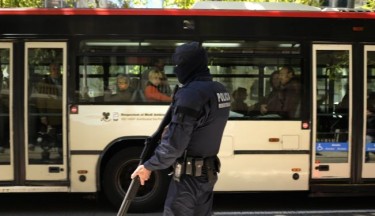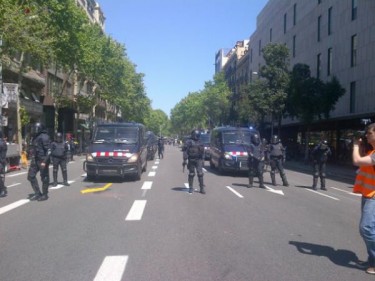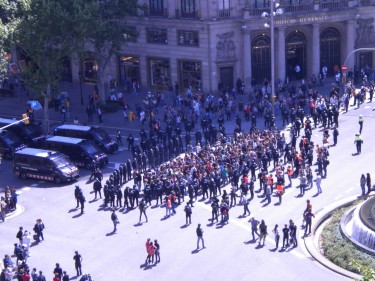This post is part of our special coverage Europe in Crisis.
On May 2, 3, and 4 the European Central Bank meeting took place in Barcelona, Spain, a city that became sieged by the police: 8,000 police were drafted into the Catalan capital, a total of 2,300 national police officers and 1,200 civil guards, plus 4,500 troopers (Mossos d’Esquadra).
For this meeting, Spain temporarily (from April 28 until May 4) suspended the Treaty of Schengen [es] on the border with France. The Schengen agreement eliminates internal border controls between some European countries and creates only one external border where entering controls to the Schengen Area. The Schengen Area comprises only some of the member states of the European Community.

Barcelona, police city. http://t.co/QlZ3g0bJ
@premsaindignada: Jueces para la Democracia “suspender Schengen es de Estado democrático miope” http://bit.ly/BienvenidoMrBCEweb #bienvenidoMrBCE http://bit.ly/J2ccqP
Also through Twitter, the police itself warned the citizens in an extremely patronizing way:
@policia: Recordad: Hasta el viernes, 4, suspendido Tratado Schengen y restablecidos los controles fronterizos en España y se refuerzan en
#Catalunya
The suspension of the treaty is due to political reasons, in case any violent incidents were to happen between the so-called anti system groups and the groups in charge of the security during the meeting. This was a greater deployment than the one during the 1992 Olympic Games in Barcelona, from snipers positioned in the Arts Hotel, where the economic ministers stayed, to random searches, stopping people on the street for no reason and searching their bags.
Such deployment resulted in 10 people arrested on the border, 18 people denied entrance to Spain, and more than 126 000 people searched (ID verification and even car search) while trying to cross the border [es]. People who had pending charges with the police were also arrested.

Riot police, Barcelona http://pic.twitter.com/o5kLKIhe
During the meeting, Barcelona did not witness the expected violence because the city turned its back on those attending the meeting; however, to a greater or lesser extent, there was some protesting:
@Acampadabcn; Recordar mostrar vuestro rechazo al BCE a las 21:00h en forma de cacerolada… Que nos oigan! http://bit.ly/cassoladaBCE
#CassoladaBCE
On May 3, there was a student demonstration against budget cuts in public higher education and against the raise in tuition fees. Even though this demonstration was peaceful, the political leaders in charge behaved like bullies when they ordered the riot police to surround the last protesters and direct them in a provocative way, as can be seen in this photo and video.

Student demonstrators completely surrounded by riot police. http://imgur.com/tQ2cc
A comment from the video youtube account reads:
Yo estuve allí y te lo puedo explicar. Al final de una manifestación pacífica sin altercados, un grupo reducido de esa misma manifestación decidimos seguirla hasta una universidad de la zona donde había comida y actos por el tema de la subida de las tasas universitarias. A la altura de plaza Cataluña la policía que nos iba persiguiendo en furgonetas nos rodean sin ningun motivo, nos encierran con coacción y nos empiezan a grabar e intimidar.
This is how the right to protest is respected in Spain:
http://www.youtube.com/watch?v=HLVUCGactac
The European Central Bank (ECB) and its head, Mario Draghi, who was CEO of the World Bank and the European vice-president of Goldman Sachs, asked Spain to continue with the current reforms and to persevere in helping the banks.
This post is part of our special coverage Europe in Crisis.







1 comment
Next Saturday the 15M movement will be on the streets of Madrid to remember the beginning of the #spanishrevolution a year ago.